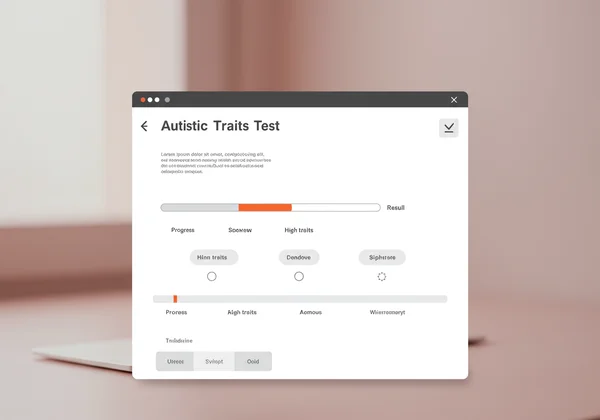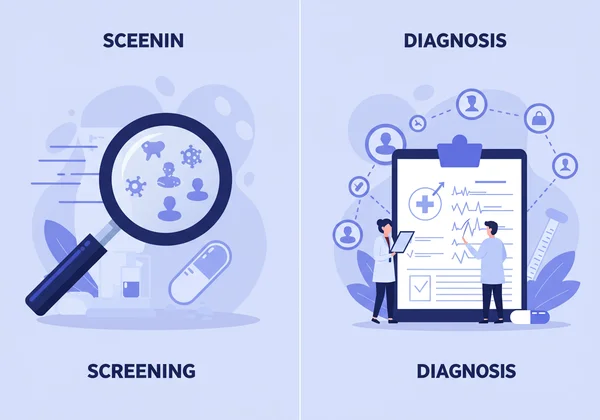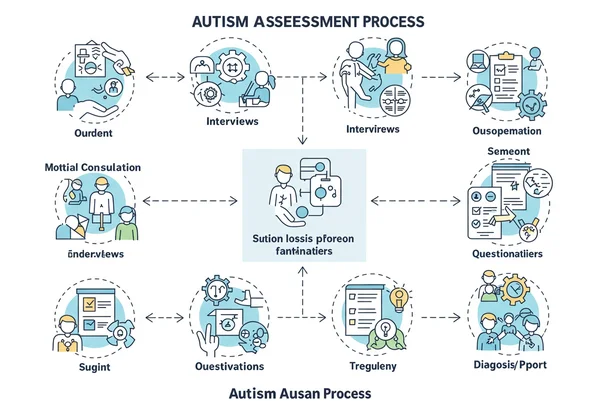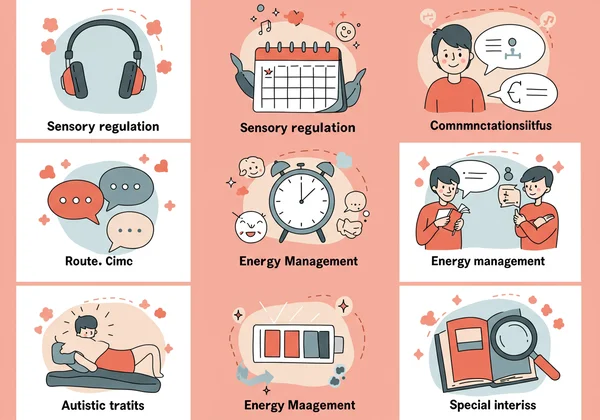Keputusan Ujian Autisme: Langkah Seterusnya Selepas Saringan Dalam Talian
Anda baru sahaja melengkapkan ujian autisme dalam talian atau saringan ciri-ciri, dan kini anda menerima keputusannya. Momen ini boleh membawa gelombang emosi—mungkin kejelasan, kekeliruan, kebimbangan, atau bahkan kelegaan. Apa yang perlu dilakukan selepas skor tinggi pada ujian autisme? Panduan ini menawarkan langkah seterusnya yang jelas, boleh diambil tindakan, dan penuh kasih sayang untuk membantu anda mentafsir keputusan anda secara bertanggungjawab. Sama ada anda sedang mempertimbangkan penerokaan lanjut atau sekadar merangkul pemahaman diri yang lebih mendalam, kami akan membantu anda menavigasi laluan anda ke hadapan.
Memahami Skor Ciri Autisme Dalam Talian Anda
Menerima keputusan daripada alat saringan dalam talian seperti kami adalah momen penting dalam penemuan diri. Alat-alat ini direka untuk memberikan pandangan, tetapi adalah penting untuk memahami apa yang sebenarnya dimaksudkan oleh skor ujian ciri autisme anda.
Apa Maksud Skor "Ciri Autisme" Sebenarnya
Alat saringan dalam talian, selalunya berdasarkan soal selidik yang mantap, menilai kehadiran ciri autisme merentasi pelbagai domain seperti interaksi sosial, komunikasi, imaginasi, dan perhatian terhadap perincian. Skor yang lebih tinggi menunjukkan bahawa anda menunjukkan lebih banyak ciri yang biasa dikaitkan dengan gangguan spektrum autisme (ASD). Ini tidak bermakna anda adalah autistik, tetapi sebaliknya ciri-ciri ini hadir dengan cara yang mungkin memerlukan pertimbangan lanjut. Ia adalah petunjuk berharga untuk refleksi diri dan titik permulaan yang berpotensi untuk memahami diri anda atau orang tersayang dengan lebih baik.

Saringan vs. Diagnosis: Mengapa Perbezaan Itu Penting
Adalah penting untuk mengingati perbezaan utama antara alat saringan dan diagnosis formal. Ujian saringan autisme dalam talian adalah langkah awal, cara untuk mengukur sama ada penilaian formal mungkin bermanfaat. Ia membantu mengenal pasti corak dan kecenderungan yang selaras dengan profil autistik. Walau bagaimanapun, ia tidak boleh, dan tidak, memberikan diagnosis perubatan. Hanya profesional penjagaan kesihatan yang berkelayakan, seperti ahli psikologi, psikiatri, atau pakar neurodevelopmental, yang boleh mendiagnosis autisme secara formal. Perbezaan ini memastikan penggunaan alat dalam talian yang bertanggungjawab dan melindungi individu daripada salah mentafsir keputusan mereka. Untuk gambaran keseluruhan yang komprehensif tentang cara mentafsir skor anda dan apa maksudnya, pertimbangkan untuk meneroka sumber komprehensif kami di mana anda juga boleh mendapatkan laporan analisis yang diperibadikan.

Memutuskan Penilaian Autisme Formal
Bagi ramai, skor autisme tinggi yang ketara pada saringan dalam talian mencetuskan persoalan sama ada untuk mendapatkan penilaian formal. Keputusan ini adalah peribadi dan bergantung pada keperluan serta matlamat individu anda.
Bilakah Perlu Mempertimbangkan Mencari Penilaian Profesional
Memikirkan diagnosis formal adalah langkah yang besar. Anda mungkin mempertimbangkannya jika:
- Ciri-ciri yang dikenal pasti dalam saringan secara ketara mempengaruhi kehidupan harian, perhubungan, atau kerja anda.
- Anda merasakan kesesuaian yang kuat dengan penerangan dan pengalaman komuniti autistik.
- Diagnosis formal boleh membuka sokongan, akomodasi, atau terapi khusus yang anda perlukan.
- Anda hanya menginginkan jawapan yang pasti untuk lebih memahami identiti dan pengalaman hidup anda. Mencari penilaian formal boleh memberikan kejelasan, pengesahan, dan laluan kepada sokongan yang disesuaikan. Ia adalah langkah proaktif dalam memahami diri anda atau anak anda dengan lebih mendalam.
Menavigasi Proses Penilaian Autisme
Proses penilaian autisme untuk orang dewasa atau kanak-kanak biasanya melibatkan beberapa peringkat, sedikit berbeza mengikut wilayah dan juruperunding. Secara amnya, ia bermula dengan konsultasi awal di mana kebimbangan dibincangkan. Ini diikuti dengan satu siri temu bual berstruktur, pemerhatian, dan soal selidik. Profesional mengumpul maklumat daripada pelbagai sumber, termasuk sejarah perkembangan, cabaran semasa, dan kekuatan. Bagi orang dewasa, ini mungkin melibatkan kajian semula laporan sekolah lama atau bercakap dengan ahli keluarga (dengan kebenaran). Tujuannya adalah untuk membina gambaran komprehensif mengenai profil neurodevelopmental seseorang. Pendekatan menyeluruh ini memastikan pemahaman yang tepat dan holistik.

Mencari Profesional Neurodevelopmental yang Berkelayakan
Mencari profesional yang betul adalah kunci apabila mencari diagnosis autisme untuk dewasa atau penilaian kanak-kanak. Cari ahli psikologi, psikiatri, ahli neurologi, atau pakar neurodevelopmental berlesen yang mempunyai pengalaman dengan penilaian autisme, terutamanya pada orang dewasa jika itu adalah fokus anda. Anda boleh mulakan dengan meminta rujukan daripada doktor penjagaan primer anda, menyemak dengan organisasi sokongan autisme tempatan, atau mencari direktori dalam talian untuk pakar di kawasan anda. Jangan teragak-agak untuk bertanya tentang pengalaman mereka, kaedah penilaian, dan sama ada mereka memahami amalan yang menyokong neurodiversiti. Padanan yang baik akan menjadikan perjalanan penilaian lebih selesa dan berkesan. Bagi mereka yang telah mengambil ujian autisme dalam talian dan kini mencari sumber lanjut, platform kami menawarkan titik permulaan yang menyokong untuk mengetahui lebih lanjut.
Merangkul Penemuan Diri & Sokongan Melangkaui Diagnosis
Tanpa mengira sama ada anda meneruskan diagnosis formal, keputusan ujian autisme dalam talian anda boleh menjadi pemangkin yang kuat untuk penemuan diri dan pertumbuhan. Ramai individu memilih untuk merangkul ciri autistik mereka tanpa label formal, mendapati nilai yang besar dalam pemahaman diri dan sambungan komuniti.
Memanfaatkan Ciri Anda untuk Pemahaman Diri dan Pertumbuhan
Menyedari bahawa anda mempunyai ciri autisme boleh menjadi momen yang benar-benar transformatif. Ia menawarkan lensa baharu untuk memahami pengalaman masa lalu, cabaran semasa, dan kekuatan unik anda. Rangkullah pemahaman diri baharu ini, dan anda akan mendapati cara yang berkesan untuk membina strategi yang benar-benar berfungsi untuk anda. Mungkin anda sentiasa cemerlang dalam tugas yang berorientasikan perincian; kini anda memahami mengapa. Situasi sosial mungkin terasa melelahkan; belajar tentang penyamaran boleh membantu anda menjimatkan tenaga. Perjalanan penerimaan diri ini boleh membawa kepada kehidupan yang lebih kaya dan lebih tulen. Platform kami menawarkan pandangan untuk membantu anda memulakan perjalanan penerokaan diri ini dengan segera.
Strategi Praktikal untuk Kesejahteraan Harian dengan Ciri Autisme
Walaupun tanpa diagnosis formal, melaksanakan strategi praktikal boleh meningkatkan kesejahteraan harian dengan ketara.
- Regulasi Deria: Kenal pasti pencetus deria dan bangunkan mekanisme menangani (cth., fon kepala pembatal hingar, mainan fidget).
- Rutinitas dan Struktur: Individu autistik sering berkembang maju dengan kebolehramalan. Wujudkan rutin yang memberikan keselesaan dan mengurangkan kebimbangan.
- Komunikasi Jelas: Berlatih menjadi langsung dan memperjuangkan keperluan anda dalam perhubungan dan tetapan profesional.
- Pengurusan Tenaga: Kenal pasti had sosial dan deria anda untuk mengelakkan keletihan. "Penyamaran" boleh melelahkan, jadi berikan diri anda masa untuk melepaskannya.
- Minat Khas: Terokai minat anda. Ia boleh menjadi sumber kegembiraan, kelonggaran, dan sambungan yang mendalam.
Strategi ini, yang dimaklumkan oleh pemahaman tentang pandangan ujian gangguan spektrum autisme, boleh membawa kepada advokasi diri yang lebih besar dan kualiti hidup yang lebih baik.

Berhubung dengan Komuniti Neurodivergen
Mencari komuniti adalah langkah seterusnya yang tidak ternilai selepas keputusan ujian dalam talian. Forum dalam talian, kumpulan sokongan tempatan, dan platform media sosial adalah ruang yang meriah di mana individu neurodivergen berkongsi pengalaman, menawarkan nasihat, dan mencari rasa kekitaan. Berhubung dengan orang lain yang memahami cara unik anda mengalami dunia boleh mengurangkan perasaan terasing dan memberikan rasa pengesahan. Ramai orang mendapati kekuatan dan identiti yang besar dalam komuniti ini, sama ada mereka mempunyai diagnosis formal atau sekadar meneroka ciri autisme mereka. Anda boleh mencari sumber dan pandangan yang lebih mendalam tentang profil peribadi anda dengan memilih laporan analisis peribadi dikuasakan AI di platform kami selepas melengkapkan saringan anda.

Perjalanan Penemuan Diri Anda Berterusan
Melengkapkan ujian autisme dalam talian hanyalah permulaan perjalanan yang mendalam. Sama ada anda memutuskan untuk meneruskan diagnosis formal atau sekadar merangkul pemahaman yang lebih mendalam tentang neurotaip anda, ingatlah bahawa pengetahuan itu memberdayakan. Tapak web kami ada di sini untuk menjadi sumber yang bertanggungjawab dan menyokong, menyediakan alat saringan yang dimaklumkan secara saintifik sebagai titik permulaan. Kami percaya dalam menjadikan penerokaan lebih mudah dan kehidupan lebih kaya.
Kami menggalakkan anda untuk terus belajar, bertanya soalan, dan berhubung dengan sumber yang ber resonans dengan pengalaman anda. Laluan ini unik untuk anda, dan setiap langkah yang diambil ke arah pemahaman diri adalah langkah ke arah kehidupan yang lebih memuaskan. Sedia untuk meneroka lebih lanjut? Ambil ujian autisme percuma anda dalam talian dan temui lebih lanjut tentang diri anda hari ini.
Soalan Lazim Mengenai Langkah Seterusnya Saringan Ciri Autisme
Adakah ujian autisme dalam talian boleh digunakan untuk diagnosis?
Tidak, ujian autisme dalam talian adalah alat saringan, bukan alat diagnostik. Ia boleh menunjukkan kehadiran ciri autisme, menunjukkan bahawa penilaian profesional lanjut mungkin bermanfaat. Hanya profesional penjagaan kesihatan yang berkelayakan yang boleh memberikan diagnosis formal gangguan spektrum autisme.
Apa yang sebenarnya ditunjukkan oleh skor tinggi pada ujian autisme?
Skor autisme tinggi pada saringan dalam talian menunjukkan bahawa anda menunjukkan sejumlah besar ciri yang biasa dikaitkan dengan autisme. Ia menunjukkan bahawa corak pemikiran, perasaan, dan tingkah laku anda selaras dengan profil autistik, memerlukan penerokaan diri yang lebih mendalam atau penilaian profesional. Ia bukanlah diagnosis.
Bagaimana saya boleh meneroka ciri autisme saya tanpa diagnosis formal?
Ramai orang memilih untuk meneroka ciri autisme mereka melalui pendidikan diri, berhubung dengan komuniti neurodivergen dalam talian, dan melaksanakan strategi menangani praktikal. Sumber kami menawarkan laporan analisis peribadi terperinci yang boleh memberikan pandangan mendalam dan panduan yang boleh diambil tindakan walaupun tanpa diagnosis formal.
Bolehkah seseorang autistik 'pada tahap ringan'?
Autisme adalah spektrum, bermakna individu mengalami ciri-ciri dengan intensiti yang berbeza dan dalam gabungan yang berbeza. Walaupun tiada diagnosis autistik "sedikit", ramai orang mengenal pasti dengan ciri ujian gangguan spektrum autisme tertentu tanpa memenuhi kriteria untuk diagnosis formal, sering merujuk kepada diri mereka sebagai mempunyai "ciri autisme" atau "berada dalam spektrum" dalam pengertian tidak formal.
Apakah sumber yang tersedia untuk orang dewasa yang baru meneroka autisme?
Untuk orang dewasa yang baru meneroka autisme, sumber yang berharga termasuk komuniti dalam talian, kumpulan sokongan, buku oleh penulis autistik, dan laman web seperti kami yang menawarkan maklumat dan saringan awal. Jika anda sedang mempertimbangkan langkah seterusnya, penilaian profesional boleh memberikan panduan peribadi dan akses kepada sokongan tambahan. Temui pandangan anda dengan alat kami yang tepat.